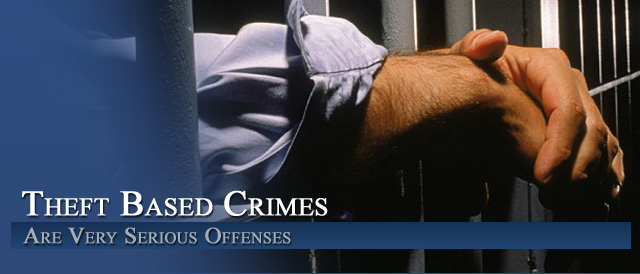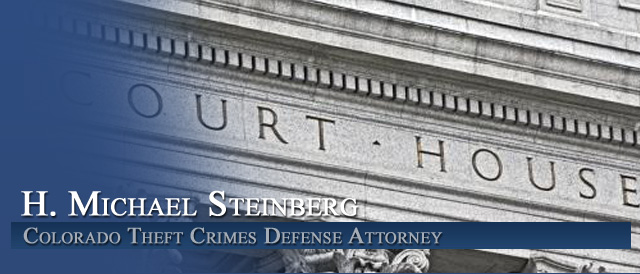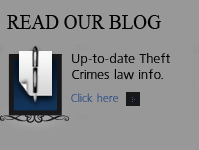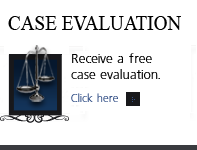




What Happens When Colorado Criminal Laws Change – Cui Bono? (Who Benefits)
By H. Michael Steinberg Colorado Theft Crimes Criminal Defense Lawyer – Attorney
What Happens When Colorado Criminal Laws Change – Cui Bono?(Who Benefits) – One of the most confusing areas of Colorado Criminal Law is when the criminal laws change. Whether a person who is being prosecuted or even has suffered a conviction under the old law can benefit from the change in the law is the subject of this article.
One example – in 2013 Colorado’s Theft Laws were “reclassified” to reflect a change in the value of money itself over time. The classification of each level of theft and therefore the punishment for each theft under 18-4-401 was significantly reduced. One felony, for example, the theft of items valued between $5000 and $20,000 was reduced from a class 4 to a class 5 felony.
Question: Can a person already convicted before the effective date of the change in the law – take advantage of the change.
Answer: Maybe…
A Challenge To An Illegal Sentence Can Be Filed At Any Time
The simple rule is this – a Defendant may raise a claim at any time that their sentence was not authorized by law.
Having written that – the next question is this:
Question: When Colorado Criminal Laws are amended by new legislation, is the change retroactively applied?
Answer: It depends – here is the analysis.
The General Rule: Changes To Colorado Criminal Law Are Presumed To Apply Prospectively And NOT Retroactively
To determine whether a new Colorado Criminal Law will confer a benefit on a sentence – you first look at the plain language of the statute itself.
Statutes that specifically state that they are to apply only to offenses committed after the effective date of the new law are applied accordingly.
A Colorado law – Section 2-4-202 specifically states:
“A statute is presumed to be prospective in its operation.” § 2- 4-202, C.R.S.
Colorado criminal law generally provides that new or amended statutes operate prospectively, while cases that are appealed “judicial decisions” – are applied retroactively. For there to be an exception to the general rule of prospective application of new or amended laws – the Colorado State Legislature must clearly “manifest” their intent to apply that change in the law to prior cases.
What Happens When The Colorado State Legislature Is Silent On Whether A New Or Amended Law As Regards The Effective Date Of That Law?
There are times when the Colorado State Legislative intent is silent on the effective date of a new or amended law – under these circumstances a Defendant may seek retroactive application of a statute if he or she benefits from a significant change in the law.
The law in this situation is this – whenever it is “constitutionally possible” – a criminal Defendant should be granted the benefits of amendatory legislation that mitigates the penalty for a crime.
When the Colorado State Legislature amended the Colorado Theft Statute – 18-4-401 – in 2013 that amendment was silent as to whether the changed law applied retroactively or prospectively, and the legislature provided no guidance as to its application.
In this situation the Colorado Courts Of Appeals held that the theft amendment applied retroactively to cases pending in the trial court when the amendment was enacted.
To make that finding the Court looked at Section 18-1-410(1)(f)(I) which section expressly applies to statutory amendments.
Here is that statute 18-1-410:
§ 18-1-410 Post-conviction Remedy
(1) Notwithstanding the fact that no review of a conviction of crime was sought by appeal within the time prescribed therefor, or that a judgment of conviction was affirmed upon appeal, every person convicted of a crime is entitled as a matter of right to make applications for postconviction review.
Except as otherwise required by subsection (1.5) of this section, an application for postconviction review must, in good faith, allege one or more of the following grounds to justify a hearing thereon:
(a) That the conviction was obtained or sentence imposed in violation of the constitution or laws of the United States or the constitution or laws of this state;
(b) That the applicant was convicted under a statute that is in violation of the constitution of the United States or the constitution of this state, or that the conduct for which the applicant was prosecuted is constitutionally protected;
(c) That the court rendering judgment was without jurisdiction over the person of the applicant or the subject matter;
(d) That the sentence imposed exceeded the maximum authorized by law, or is otherwise not in accordance with the sentence authorized by law;
(e) That there exists evidence of material facts, not theretofore presented and heard, which, by the exercise of reasonable diligence, could not have been known to or learned of by the defendant or his attorney prior to the submission of the issues to the court or jury, and which requires vacation of the conviction or sentence in the interest of justice;
(f) (I) That there has been significant change in the law, applied to the applicant’s conviction or sentence, allowing in the interests of justice retroactive application of the changed legal standard.
(II) The ground set forth in this paragraph (f) may not be asserted if, prior to filing for relief pursuant to this paragraph (f), a person has not sought appeal of a conviction within the time prescribed therefor or if a judgment of conviction has been affirmed upon appeal.
(g) Any grounds otherwise properly the basis for collateral attack upon a criminal judgment; or
(h) That the sentence imposed has been fully served or that there has been unlawful revocation of parole, probation, or conditional release.
(1.5) An application for postconviction review in a class 1 felony case where a sentence of death has been imposed shall be limited to claims of newly discovered evidence and ineffective assistance of counsel; except that, for any sentence of death imposed on or after the date upon which the Colorado supreme court adopts rules implementing the unitary system of review established by part 2 of article 12 of title 16, C.R.S., any application for postconviction review in such case shall be governed by the provisions of part 2 of article 12 of title 16, C.R.S.
(2) (a) Except as otherwise required by paragraph (b) of this subsection (2), procedures to be followed in implementation of the right to postconviction remedy shall be as prescribed by rule of the supreme court of the state of Colorado.
(b) In any class 1 felony case where a sentence of death has been imposed, the district court shall expeditiously consider an application for postconviction remedy. It is the general assembly’s intent that the district court give priority to cases in which a sentence of death has been imposed.
(3) (a) Except as otherwise provided in paragraph (b) of this subsection (3), an appeal of any order by the district court granting or denying postconviction relief in a case in which a sentence of death has been imposed shall be to the Colorado supreme court as provided by section 13-4-102(1) (h), C.R.S. The procedures to be followed in the implementation of such review shall be in accordance with any rules adopted by the Colorado supreme court in response to the legislative intent expressed in section 16-12-101.5(1), C.R.S.
(b) In any class 1 felony case in which a sentence of death is imposed on or after the date upon which the Colorado supreme court adopts rules implementing the unitary system of review established under part 2 of article 12 of title 16, C.R.S., the procedures for appealing any order by the district court granting or denying postconviction relief and review by the Colorado supreme court of such order shall be governed by the provisions of part 2 of article 12 of title 16, C.R.S., and by such rules adopted by the supreme court.
Summary And Analysis
Here is the bottom line rule – if there are legislative amendments impacting criminal cases that have prospective effective dates but no indication whether the amendments are to be applied prospectively or retroactively – there is a strong argument that – after applying § 18-1-410 (Post-conviction Remedies) – a Defendant should be given the benefit of the changed law if the case at issue was in the process of being adjudicated at or around the time of the change of the law.
What Happens When Colorado Criminal Laws Change – Cui Bono? (Who Benefits)
If you found any of the information I have provided on this web page article helpful please click my Plus+1 or the Share buttons for Twitter and Facebook below so that others may also find it.
The reader is admonished that Colorado criminal law, like criminal law in every state and at the Federal level, changes constantly. The article appearing above was accurate at the time it was drafted but it cannot account for changes occurring after it was uploaded.
If, after reading this article, you have questions about your case and would like to consider retaining our law firm, we invite you to contact us at the Steinberg Colorado Criminal Defense Law Firm – 303-627-7777.
Never stop fighting – never stop believing in yourself and your right to due process of law. You will not be alone in court, H. Michael at your side every step of the way – advocating for justice and the best possible result in your case.
 ABOUT THE AUTHOR: H. Michael Steinberg – Email The Author at [email protected] – A Denver Colorado Criminal Defense Lawyer – or call his office at 303-627-7777 during business hours – or call his cell if you cannot wait and need his immediate assistance – 720-220-2277. Attorney H. Michael Steinberg is passionate about criminal defense. His extensive knowledge and experience of Colorado Criminal Law gives him the edge you need to properly handle your case.
ABOUT THE AUTHOR: H. Michael Steinberg – Email The Author at [email protected] – A Denver Colorado Criminal Defense Lawyer – or call his office at 303-627-7777 during business hours – or call his cell if you cannot wait and need his immediate assistance – 720-220-2277. Attorney H. Michael Steinberg is passionate about criminal defense. His extensive knowledge and experience of Colorado Criminal Law gives him the edge you need to properly handle your case.
“A good criminal defense lawyer is someone who devotes themselves to their client’s case from beginning to end, always realizing that this case is the most important thing in that client’s life.”
You should be careful to make a responsible choice in selecting a Colorado Criminal Defense Lawyer – and we encourage you to “vet” our firm. Over the last 40 plus years – by focusing ONLY on Colorado criminal law – H. Michael has had the necessary time to commit to the task of constantly updating himself on nearly every area of criminal law, to include Colorado criminal law and procedure and trial and courtroom practice. H. Michael works hard to get his clients the best possible results in and out of the courtroom. He has written, and continues to write, extensively on Colorado criminal law and he hopes this article helps you in some small way – What Happens When Colorado Criminal Laws Change – Cui Bono? (Who Benefits?).

Other Articles of Interest:
- Understanding The Colorado Identity Theft Law |18-5-902
- Understanding Colorado Criminal Fraud and Forgery Laws 18-5-102
- Transitioning From The Colorado DOC (Prison System) To The Colorado Community Corrections System (Half Way House System)
- Understanding The Colorado Laws Of Embezzlement, Theft and Larceny Part I of II
- Colorado Shoplifting Law – How Far Can The Store Go To Make An Arrest?













